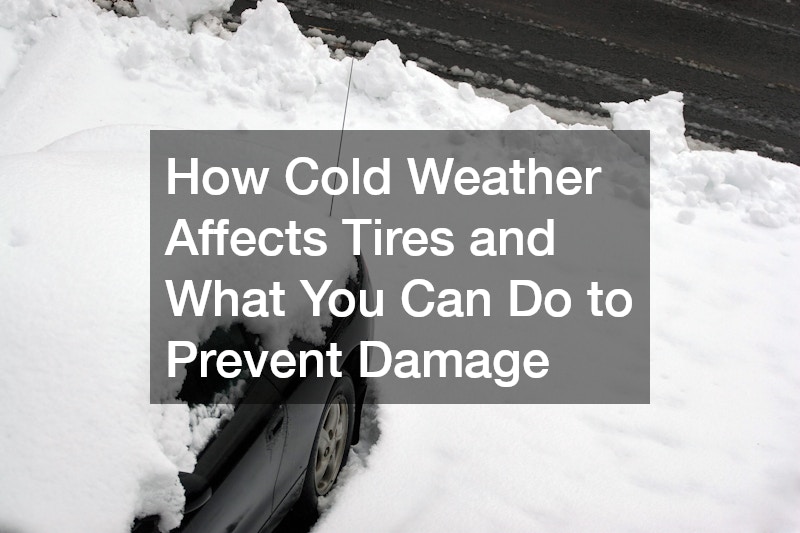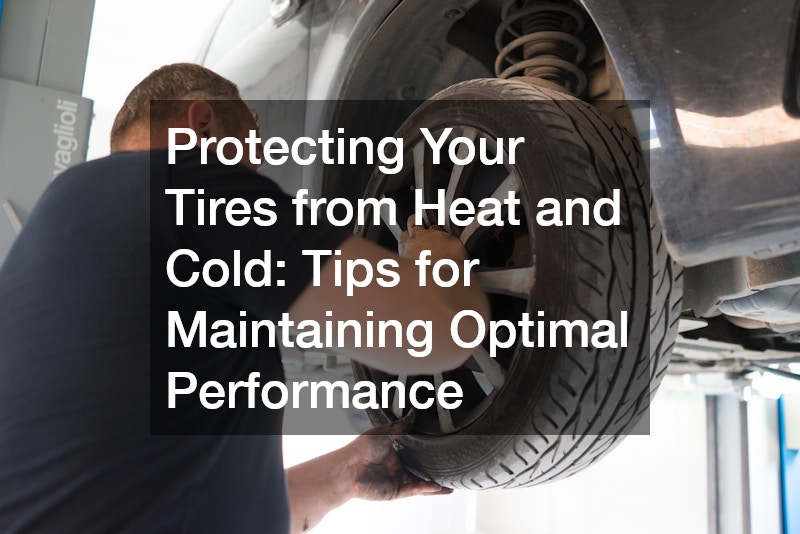As the seasons change, car owners must adapt to various environmental conditions that can drastically impact vehicle performance. Understanding how cold and hot weather affects different components of a car can prevent numerous problems in cars, ensuring safer and more reliable driving experiences. From tires to brakes and glass, each part requires care and attention when the seasons shift.
In this article, we will dive deep into how extreme temperatures and seasonal changes affect various aspects of vehicle maintenance. We’ll discuss preventative measures, the significance of regular auto repairs, and the reasons for seasonal vehicle checks. By being well-informed, car owners can save on costly repairs and enhance their cars’ longevity.
Moreover, understanding the relationship between seasonal temperature fluctuations and automotive issues can lead to more effective driving practices and enhance vehicle performance. With proper care, problems in cars can often be avoided, leading to a more efficient and enjoyable driving experience.
How Cold Weather Affects Tires and What You Can Do to Prevent Damage

Cold weather can be particularly harsh on tires, causing them to lose pressure and ultimately leading to performance problems in cars. As temperatures drop, the air inside tires contracts, lowering the tire pressure. Drivers frequently ignore the need to check tire pressure in winter months, which can lead to reduced traction and increased wear.
Additionally, colder temperatures can lead to tire cracking and other forms of degradation. The rubber compounds in tires can stiffen when exposed to extreme cold, making them more susceptible to damage from road conditions. Regular tire inspections and ensuring proper inflation levels are crucial steps in preventing potential issues related to cold weather.
To mitigate these problems, consider investing in winter tires designed to maintain pliability in low temperatures. It’s also essential for car owners to regularly rotate their tires and inspect tread depth, as these factors play a significant role in enhancing tire longevity. By being proactive, you can prevent serious problems in cars related to tire performance.
Preventing Brake Repairs: How Seasonal Changes Impact Your Vehicle’s Stopping Power
Changes in temperature and roadway conditions have a direct impact on your vehicle’s braking system, potentially leading to costly brake repairs. During winter, icy conditions can cause brakes to freeze, while summer heat can lead to brake fluid boiling, both leading to reduced stopping power. Seasonal maintenance checks are essential to ensure the braking system is functioning optimally.
Regularly checking brake pads and rotors can help ensure that your vehicle maintains its stopping power, regardless of the season. In colder climates, it’s crucial to be mindful of the added stress that cold weather can place on the braking system—ice and snow create additional risks that can compromise safety. Addressing any noted wear or issues promptly can prevent unnecessary problems in cars.
Moreover, understanding the importance of brake fluid is critical. It is hygroscopic, meaning it absorbs moisture over time, which can lead to brake failure during peak driving seasons. Regular checks and maintenance can help prevent these issues, keeping your brakes in peak condition through each change of season.
How Auto Repairs Are Essential During Seasonal Transitions
As seasons change, the diverse weather patterns can expose various problems in cars that may not be apparent during milder weather. Routine auto repairs become vital to address any wear and tear that has accumulated and to prepare your vehicle for the challenges of upcoming seasons. Transitioning between summer to winter involves checking essential components, such as tires, brakes, and fluids.
Each season presents unique challenges; for instance, cold temperatures can cause engines to work harder, leading to potential mechanical failures if not attended to. Having regular maintenance performed by an experienced mechanic can help identify underlying problems before they become larger, more costly issues. Auto repairs shouldn’t just be routine; they should be informed by the challenges each season brings.
Regular inspections can save car owners time and money by preventing more severe mechanical failures. High-quality auto repairs not only keep the vehicle performing at its best but can also increase its resale value. Car owners must understand that seasonal transitions are an ideal time to invest in maintenance and repairs to avoid unnecessary expenses down the line.
Auto Glass: How Winter Weather Can Lead to Cracks and Chips

Winter’s cold, harsh conditions can be tough on auto glass, leading to chips, cracks, and sometimes complete shattering due to temperature fluctuations. Rapid temperature changes can create stress on glass, especially when heated defrosters are used to clear ice from the windshield. This type of damage not only impairs visibility but can also lead to more significant problems down the line.
In some cases, small chips can grow into larger cracks if left unaddressed. Getting these repairs done quickly can help mitigate further problems in cars, as well as prevent more extensive damage to other parts of the vehicle. Regular maintenance checks, especially before winter, should include inspections of auto glass for any pre-existing damage.
Additionally, many auto insurance services cover glass repairs, making it a more affordable option for car owners. Addressing minor damages proactively can save money in the long run, as replacement costs are exponentially higher than repairs for small chips or cracks. Being mindful of auto glass condition is crucial for long-term vehicle maintenance.
Why Towing Services May Be Needed More Often During Seasonal Weather Shifts

Weather shifts can increase the likelihood of vehicle breakdowns, making reliable towing services more necessary during these transitions. Rain, snow, and ice create hazardous driving conditions that can lead to accidents and subsequent vehicle failures. Ensuring fast access to towing services is crucial for minimizing stress during such emergencies.
Moreover, when vehicles experience common issues linked to seasonal changes, such as dead batteries or transmission problems, towing services are often required to transport them to auto shops for repairs. Recognizing this need ahead of time allows car owners to connect with local service providers, enhancing their efficiency during potentially stressful situations. Towing services can ease the burden of unexpected problems in cars, offering peace of mind while traveling.
It’s advisable to keep a list of trusted towing services handy, especially when heading into challenging weather conditions. This preparation can save valuable time and potentially costly damage that could occur if a vehicle is left stranded in unfavorable conditions. Towing services become an essential component to consider in yearly vehicle care planning.
Protecting Your Tires from Heat and Cold: Tips for Maintaining Optimal Performance

Proper tire maintenance is essential for ensuring vehicles perform optimally throughout all seasons. Tire care includes regular inspections for wear and adequate pressure checks, especially as temperatures fluctuate. Understanding how heat and cold affect tires can help car owners prevent problems before they arise.
For instance, in hot weather, tires can overinflate due to air expanding, leading to increased wear and a higher risk of blowouts. Conversely, cold weather can lead to underinflation and decreased traction, particularly on slick roads. Both conditions can create severe problems in cars, so maintaining a regular schedule of tire checks is essential.
Investing in high-quality tires suited for seasonal conditions is also recommended. Winter tires, for example, are designed to handle cold temperatures and icy roads better than standard tires. Regular rotation and balancing can extend the lifespan of tires and enhance safety on the road.
How Transmission Repairs Can Help Prevent Serious Issues During Extreme Weather
Transmission issues can often manifest during periods of extreme weather, necessitating timely repairs to prevent severe damage. Cold temperatures can significantly affect the performance of both manual and automatic transmissions, leading to shifting problems and ultimately contributing to other problems in cars. Regular maintenance and fluid checks are essential for preventing these transmission challenges.
Neglecting to address small transmission problems can lead to more costly repairs, including complete transmission failure. A well-functioning transmission is crucial for vehicle performance, particularly when driving in challenging conditions. Car owners should be vigilant about any signs of transmission failure, such as unusual noises or shifting delays.
During seasonal changes, it is wise to have the transmission system thoroughly inspected by professionals for any potential weaknesses. By being proactive in addressing transmission repairs, car owners can minimize risks and extend their vehicle’s lifespan, keeping them safer on the road. Transmission maintenance is an investment in the vehicle’s overall health.
The Importance of Auto Insurance Services When Facing Seasonal Driving Conditions
Auto insurance services play a critical role in protecting vehicles from the financial implications of seasonal damage and accidents. With harsher weather comes a higher likelihood of accidents, breakdowns, and repairs, making comprehensive coverage vital for car owners. Failing to prioritize adequate insurance can lead car owners to face overwhelming costs when problems in cars arise.
Choosing the right insurance coverage can provide peace of mind during uncertain driving conditions. It allows drivers to focus on safety rather than worrying about the high costs associated with unforeseen repairs or accidents. Regularly reviewing insurance policies ensures they are suited to seasonal challenges.
Ultimately, understanding the nuances of auto insurance can save car owners from significant financial burdens, especially during the demanding winter and summer months. Budgeting for potential costs associated with towing services, repairs, and more can lead to smarter, proactive decisions. Regular communication with insurance agents can help car owners adapt their policies for seasonal needs.
Auto Body Shops: How Winter and Summer Can Cause Dents and Paint Damage
Changing seasons can lead to various issues that require the expert attention of auto body shops. For example, winter storms can create hazardous road conditions, leading to increased risk of dents from other vehicles or debris. Similarly, summer heat can cause paint damage and fading if vehicles are exposed to the elements for extended periods without proper protection.
Severe weather conditions hold the potential to cause significant cosmetic damage to vehicles. Regular inspections at auto body shops can help nip these problems in the bud by detecting early signs of wear. Prompt action can prevent problems from escalating into larger, more expensive repairs.
Moreover, understanding how to protect your vehicle’s exterior from seasonal wear can enhance its resale value. Investing in paint protection films, regular washes, and proper storage can help keep vehicles looking new. By acknowledging the impact of seasonal changes, car owners can be proactive about their vehicle maintenance strategy.
Tips for Preventing Battery Failures in Cold Weather
Cold weather can take a serious toll on vehicle batteries, leading to increased failures during winter months. Car batteries can lose up to 60% of their strength at freezing temperatures, making it vital to recognize the signs of wear. Regular battery checks and ensuring proper connections are key tasks for preventing problems in cars as temperatures drop.
Along with regular maintenance, car owners should consider battery replacement if they notice a diminished response during the winter. Understanding how batteries work under extreme conditions can help owners anticipate potential issues and plan accordingly. Starting issues can often signal impending battery failure, necessitating prompt attention.
Investing in a high-quality battery designed for extreme temperatures can improve reliability. Proper storage and charging practices can also prolong battery life in harsh winters. Monitoring battery performance with the changing seasons can lead to more informed decisions about maintenance and replacements.
How Seasonal Temperature Fluctuations Can Affect Your Car’s Fluid Levels
Seasonal fluctuations can greatly impact various fluid levels within a vehicle, leading to potential problems in cars if not monitored regularly. Engine oil, coolant, brake fluid, and transmission fluid can all react differently depending on extreme temperatures. Understanding how to check and maintain these fluids is essential for optimal car performance and longevity.
For instance, engine oil may thicken in colder temperatures, which can lead to difficulty in starting the vehicle or increasing wear on engine parts. Conversely, excessive heat can cause fluids to thin, resulting in a decreased ability to lubricate effectively. Regular checks of fluid levels, especially before a seasonal change, can prevent performance issues.
Moreover, seasonal temperature changes can also affect the viscosity and function of brake fluid, impacting safety. When preparing your vehicle for seasonal transitions, a complete fluid check must be prioritized. Taking preventive action can mitigate the risk of fluid-related problems in cars throughout harsh weather conditions.
Preparing Your Car’s Cooling System for Hot Summer and Cold Winter Months
Your vehicle’s cooling system is essential for maintaining optimal engine temperature year-round, particularly during extreme seasons. Summer heat can elevate engine temperatures, while cold winter months require efficient coolant circulation to prevent freezing. Preparing the cooling system is a crucial step in avoiding serious engine problems in cars.
A full coolant flush and replacement before summer can significantly improve performance and prevent overheating. Similarly, in winter, checking antifreeze levels and ensuring the system is free of leaks can prevent freezing and possible engine damage. Regular maintenance of the cooling system ensures efficiency and longevity.
Moreover, maintaining the cooling system can yield other benefits, including improved engine performance and fuel efficiency. Car owners should regularly inspect hoses and connections for any signs of wear or damage, ultimately avoiding costly car repairs. Staying proactive with the cooling system can prevent serious breakdowns and avoid problems in cars later on.
Why Seasonal Tire Swaps Are Essential for Maintaining Safety and Performance
Changing tires with the seasons is essential for car safety and optimal performance, as different tires are designed for specific weather conditions. Winter tires, for example, offer better traction and handling on icy roads, while summer tires are built for performance in dry and wet conditions. Neglecting to swap tires seasonally can lead to handling problems and increased accidents.
When it comes to performance problems in cars, utilizing the appropriate seasonal tires can make a notable difference in driving safety. The tread patterns on tires designed for different weather conditions are specifically engineered to optimize grip and handling. Car owners who invest in seasonal tire changes enhance their vehicle’s performance and longevity.
Furthermore, regularly swapping tires can also prevent premature wear. Keeping an eye on tread depth is vital, and professional rotation can extend the lifespan of both sets of tires. Seasonal changes bring various driving challenges, and being adequately equipped ensures the vehicle remains reliable regardless of the weather. Don’t forget to check your auto supplies for items like tire pressure gauges, tire inflators, and cleaning products to maintain your tires and keep them in top shape during seasonal transitions.
Understanding the seasonal changes affecting vehicle performance is vital for maintaining a safe and efficient driving experience. Whether it’s the impact of cold weather on tires and battery life or the necessity of regular car repairs, being proactive can mitigate problems in cars. From utilizing towing services to staying prepared with auto insurance, there are various steps car owners can take to protect their vehicles throughout the year.
Investing time in regular vehicle maintenance can save money and ensure reliability on the road. The seasons bring diverse challenges, but with the right information and preparation, drivers can navigate around potential issues effectively. A well-maintained vehicle not only performs better but also enhances the overall driving experience, leading to safer journeys.
By embracing a comprehensive approach to vehicle maintenance and understanding the effects of seasonal weather changes, car owners can ensure their vehicles stay in top shape year-round.
